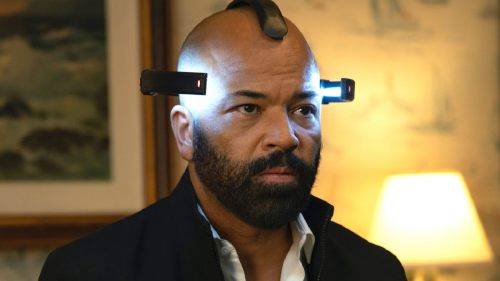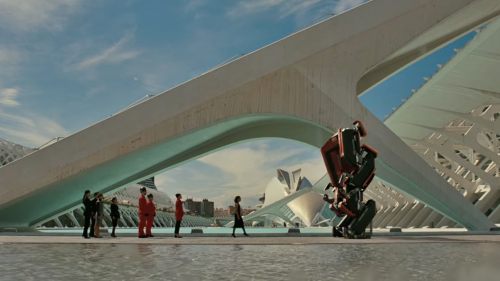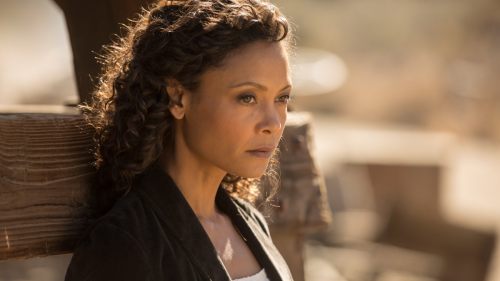WESTWORLD Review: 2.06 “Phase Space”
After a string of episodes that focused mostly on a single storyline each, this week’s Westworld returned to the show’s usual format. Juggling half a dozen stories and shuttling them forward in various increments, the episode is a shard of a whole, rather than a self-contained hour of storytelling. That said, “Phase Space” introduced significant new sci-fi concepts, and developed some of its main characters in emotionally resonant ways. And that final shot: what a twist!
Maeve received one of the most affecting and least surprising reversals this episode, strengthening her rebellious resolve in the process. Having helped Akane and company escape from the shogun’s forces (via a clumsily-shot but brutal samurai fight between Musashi and Tanaka), Maeve bears witness to a heartbreaking tribute from Akane to the fallen Sakura. Seeing Akane pay her respects to Sakura’s literal heart creates pangs of Maeve’s own maternal loss; though Akane and Musashi decline to join her on her quest, that quest feels all the more important after the sojourn to Shogun World.
From there, Maeve and her posse make rapid progress across the park, locating the old homestead in between scenes. But although Maeve’s “daughter” is right where she should be, a new host has assigned to be her mother. Of course this was going to happen. Of course Maeve’s old storyline was going to be recycled in its entirety, just with new hosts. That includes the Ghost Nation attack on the homestead; not only is Maeve forced to relive that trauma, she’s forced to watch another host live through it for the “first” time. Such is the brutality of Westworld’s treatment of its hosts: no matter which park or which narrative iteration, they’re made to suffer. It’s their lot in life.
As for Dolores, the other side of the robot-rebellion coin, it seems suspicions of Teddy’s death (after last week’s horrifying brain-scrambling) were greatly exaggerated. Teddy’s still kicking around, and even retaining his memories - but his personality has been completely rewritten, from romantic lunk to ruthless killer. It’s unclear how Teddy feels about that (if he’s even capable of doing so), but the transformation’s so complete it shocks even Dolores, like when he point-blank murders a guest Dolores is interrogating. Aside from that, Dolores’ crew enact the beginning of their plan to take the train out of Westworld. They arrive at the welcome centre in what seems to be a large train crash and explosion - but I’d bet on the hosts surviving. They’re hardy like that.
Among the living, plans are afoot in the park’s command centre. Having apprehended the Abernathy control host (and ensured his compliance by literally nailing him to a table), company official Charlotte finally sends out a distress call for have the remaining humans rescued. Clearly, whatever’s contained within Abernathy is of prime importance to the company - much more important, at any rate, than Ashley (Luke Hemsworth), who’s immediately emasculated and supplanted by awesome Scottish military type Coughlin. More of that guy please, Westworld.
Back in Westworld, William and newly-arrived daughter Grace have a lot to catch up on. Once he’s satisfied she’s not a host (will he ever be satisfied that not everything is a plot of Ford’s?), they have a pretty raw heart-to-heart around a campfire, hashing out their pasts and their attitudes towards the park and its deadly and/or sexy inhabitants. I, for one, hadn’t put the pieces of William’s history together - particularly his family history, which only emerged recently. His decision to reject both reality and his remaining family to live out a life in the park as a “pitiable manchild” feels all the more selfish in light of this scene, his relationship with Grace all the more complex, and Ed Harris’ performance all the more layered. Grace’s reaction the next morning to yet another abandonment, then, is completely understandable. Dick move, William.
Plot-wise, this week’s most intriguing developments come from the Bernard/Elsie plotline. Turns out, the reason the park can’t reboot is that something’s been actively blocking QA from restoring systems. Playing the role of Dennis Nedry in this scenario is the “Cradle,” cringily labeled “CR4-DL” - a massive server farm containing backups of all the park’s AI software. The Cradle isn’t just data, though; according to dialogue, those backups are active, thinking together in a hive mind. The implication is that the hosts’ backups, collectively, are resisting from within the park’s computer system. But that ain’t it.
In order to ascertain the specific issue, Bernard volunteers to be placed “inside” the computer, a process that involves unscrewing the top of his head, extracting his robot brain, and inserting it into the mainframe. Upon insertion, Bernard experiences the Cradle as a lifelike simulation of the park, populated by, effectively, factory-reset versions of all its characters. But that’s not all he finds. Playing the piano in Sweetwater is none other than Westworld creator Robert Ford. Surprise!
Viewers had been speculating on the return of Anthony Hopkins since his character bought it in the Season 1 finale. The character’s solution to getting shot in the head - something, apparently, he predicted - seems to have been uploading his consciousness into the Westworld computer system, where he can presumably exert even more direct control over the goings-on than as a corporeal human. This of course raises a ton of transhumanist questions, such as what the hell happens to one’s consciousness when it’s deprived of a body - but more pressingly for the plot, it suggests that much of the season’s weirdness has been Ford’s doing after all.
What is Ford’s plan? What secrets do the Ghost Nation hold for Maeve? What the hell is Abernathy guarding? What do Dolores and company hope to achieve by crashing a train into Westworld’s welcome centre? Where is the Dolores/Bernard flashback going, other than a reversal of the William/Delos training simulation from a couple weeks back? What’s Charlotte’s deal in all this? And will the Cradle’s simulation of Westworld end up as yet another layer of reality for the show to tell stories in, further complicating and confusing the narrative? We’ve got four episodes left, so the clock’s a-ticking for some answers.



